Boljovan Personalities: Difference between revisions
No edit summary |
No edit summary |
||
| Line 20: | Line 20: | ||
====Ljubomir of Mulciber==== | ====Ljubomir of Mulciber==== | ||
''Bishop of the Diocese of the Forgemaster in Western Dracia'' | ''Bishop of the Diocese of the Forgemaster in Western Dracia''[[Image:Ljubomir_of_Mulciber.png|right|200px|Ljubomir of Mulciber]] | ||
{{:Ljubomir Neculai}} | {{:Ljubomir Neculai}} | ||
Revision as of 03:46, 12 November 2016
Oratores: Those Who Pray
Albin of MinosBishop of the Diocese of the Cockerel in Boljova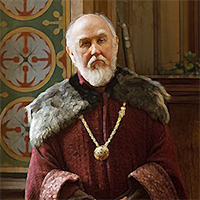 Original article: Albin Lyubka
Bishop Albin was born the fifth son of the prodigious Maxmilián IV "The High Hammer" of House Lyubka, Voievod of Boljova in 1290 IC. Albin proved to be a studious young man who had very little patience for the more boisterous past-times of his more martial brothers. He had a mind for mathematics and accounting and was more often found with his tutor from the Church of Minos than anyone else in his family. At the age of 13, he entered the priesthood of Minos as a Flamen of Minos. Albin's early career was somewhat unremarkable: he tended to be more secular than spiritual in his approach to the Church and the few who remained faithful during the Dark Times. In 1312 IC, when the Old Gods returned to the world, Albin discovered he was capable of channeling Divine magic and was called by Minos the Cockerel to continue to serve the Church. With his faith in Minos reinforced, Albin became deeply spiritual himself and worked hard to help reorganize the faltering Church in Dracia. In 1334 IC, Albin became Bishop of the Diocese of the Cockerel in Boljova, becoming one of the chief spiritual advisers to his brother, the Voievod Ljupcho of House Lyubka. Albin is known for being sober, serious and practical, in sharp contrast to his brother and, indeed, for most of House Lyubka. He is fluent or at least familiar in a dozen different languages and often serves as a translator for visiting dignitaries, both for his brother and periodically for the Queen of Dracia in Kzerna. Recently, he joined his brother on the front lines in Dracia's defense of Waldavia against Murgosia where served ably both as a spiritual leader among the troops and managing logistics for the force. |
Dominik of BaelthorBishop of the Diocese of the Stonehands in Moldogoi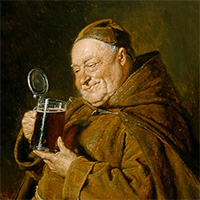 Original article: Dominik Lyubka
The venerable and beloved Bishop Dominik of Baelthor was born the third son of the Voievod of Boljova, Aleksandar II, in the early years of the Dark Times. As with many Dracian nobles of the time not standing to inherit, Dominik studied to become a brewer and founded a brewery in Moremia. He worked to organize brewers in Moremia and beyond through the chaos of the Dark Times, gaining a reputation among Dracians as more interested in fellowship than profit (to which he retorted they were one and the same). He was well on his way to becoming Master of the Guild of Brewers in Moremia when the Dark Times came to an abrupt end in 1312 IC and Dominik was called to the Church of Baelthor. At the age of 40, he entered the priesthood as an Acolyte and become a Clericus by the age of 50. During this time, he traveled extensively throughout Dracia, becoming involved not only in re-organizing the tattered remains of the Church of Baelthor, but working ecumenically to restore the priesthoods of the Old Gods (particularly the Churches of the Ilum Balthoran). In 1331 IC, Dominik was chosen as Bishop of the Diocese of the Stonehands in Moldogoi and has since worked closely with his nephew, the Voievod Ljupcho of House Lyubka. Though now advanced in age and often seeming to nap through Council meetings with his nephew, Dominik remains a wise and honest advisor to the Voievod, one of the few who can quickly quell the legendary crudeness of his nephew and put him in his place with a few sleepy reminders of his duty to family and his people. |
Ljubomir of MulciberBishop of the Diocese of the Forgemaster in Western Dracia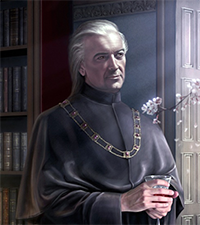 Original article: Ljubomir Neculai
Ljubomir of House Neculai was born the bastard child of Markéta, sister to the current Bȃn of Belavnik, Radomir. At a young age went the way of many young Dracian nobles who did not stand to inherit and apprenticed to become a smith, specializing in crafting arms and armor. At the age of fourteen, it was discovered that Ljubomir not only had no small talent with Enchanting, but was also capable of channeling Divine Magic. At the direction of his family, he became an Acolyte of the Church of Mulciber the Forgemaster, god of smithing and proved not only to be a talented craftsman, but was quick to make personal and political alliances as he rose through the ranks of the priesthood. Initially a clericus of the Church of the Forgemaster, Ljubomir entered work for the Dracian Royal Army at the age of 28 and served for two decades, eventually becoming Engineer Prefect for the White Eagles, the Kings's personal military regiment, in 1330 IC. He continued to serve in the same capacity when Queen Magdalena reformed the White Eagles as the Ivory Guard in 1346 IC. Five years ago, in 1349 IC, Ljubomir retired from military life and made the transition to Flamen within the Church. He was made Bishop of the Diocese of the Forgemaster in Western Dracia and has served ably in that position ever since. Ljubomir is known to be almost obsessively clean, an unusual trait in a faith filled with craftsmen, and a hard bargainer (his mercantile opponents would call him a 'cheat'). He is known to be deeply loyal to his family and the Queen personally, though since his retirement from the Ivory Guard, he has proven himself truly faithful to the precepts of Mulciber. He is active in encouraging industry in the Dracia west of the Temesh River and often serves as a mediator between craft guilds when they find themselves in dispute. Despite his noble upbringing and reputation as a hard negotiator, Ljubomir himself is something of an aesthetic and cares little for material possessions, a trait many of his fellow Dracians find bewildering. |
Violeta of MeliboeaBishop of the Diocese of the Farseer in Western Dracia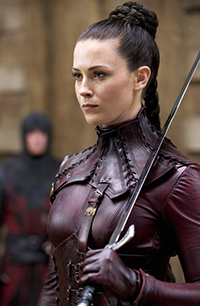 Original article: Violeta Vörös
Violeta of Meliboea was born into House Vörös, a small but ancient Dracian noble family, in 1312 IC, weeks before the end of the Dark Times and the return of the Old Gods. She was raised in [[Bistrovia|the Vojvodina of Bistrovia and entered the Church of Meliboea at a young age (some say to avoid a political marriage to an elderly member of House_Marušić). As an Acolyte of Meliboea, she became involved with a merchant's son that was apprenticed at the Temple and gave birth to a bastard son, Branimir, in 1327 IC. Despite the difficulties of balancing motherhood and her training, Violeta was a natural in combat and possessed an insight into her theological instruction that surprised her instructors. In 1331 IC, she was raised to the Order of St. Frančiška the Avenger and named Palatinus (Paladin) of Meliboea. As palatinus, she gained a reputation of being quick to action, but not rash, with an almost instinctual understanding of who was just and who was unjust. She alternately became known as an ally to the nobility of Dracia, partially because of her own noble birth, and a thorn in their side when she sensed their injustice. More than a few times, Violeta was rebuked by the Church of Minos in Dracia for acting against the mercantile interests of the Church while also being lauded for her defense of the Pokladna (Treasuries) of Minos in Boljova against human and ogre raiders. In 1348 IC, at the relatively young age of 36, Violeta became Bishop of the Diocese of the Farseer in Western Dracia. When the Boljovan Legions rose in defiance of the Dracian crown over taxation in 1353 IC, Violeta joined their movement, fighting alongside the rebels against Queen Magdalena Vtalasav and the Voievod of Boljova, Ljupcho of House Lyubka. When the rebellion was defeated, Violeta was reconciled to the secular government and pardoned by the Voivode (it is said over the private objections of the Queen herself). As part of that reconciliation, Bishop Violeta was made one of the Voievod's spiritual advisors. Though she only periodically attends to her secular political duties, she always seems to be present when a conflict is being discussed and joined the Voievod in war against Murgosia in the Dracian defense of Waldavia. The Bishop Violeta is a study in contrasts: quick-to-act but rarely rash, fiercely independent but always dutiful to her Diocese and goddess, a warrior and an advisor and a mother and a spiritual guide. Her only true constant is her passion for justice, whether that comes within the bounds of the law or without. Her allies know she can be counted on to support them when they are just, but they also know they can quickly become her foes should they act unjustly. Her son Branimir, nicknamed "The Farseer's Bastard", is an able warrior in his own right and is never far from his mother, serving officially as her Custos (Custodian). |
Bellatores: Those Who Fight
Ljupcho of House LyubkaVoievod of Boljova, Master of the Phalam Mines, Hammer of the Boltjovan Legions, Aparator of House Lyubka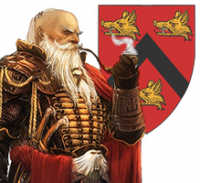 Original article: Ljupcho Lyubka
Despite his vast wealth (or perhaps because of it), Ljupcho is widely known to be as crass and crude as his fellow hillsfolk in the wild Moldogoi hills of northern Dracia. Shrewd in business as well as in war, the Voievod Ljupcho was instrumental in putting down the recent Boltjovan Rebellion. Ljupcho's sheer stubbornness and willingness to personally take the field, despite nearing his seventh decade, won both the respect of his unruly men and the Ivory Queen herself. Despite experiencing his share of setbacks in the Rebellion, he was named by the Queen "Hammer of the Boltjovan Legions". Ljupcho is loud, willful, smokes constantly and rarely completely sober, but he commands respect among his fellow nobility not only for his skill on the battlefield, but his aptitude with making coin. |